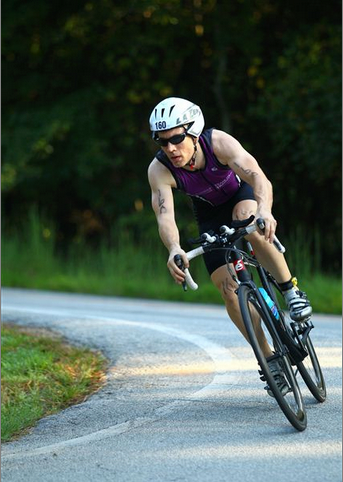
By Polly Ouellette
Forest is extremely familiar with the human body—especially since his research interests center around bioengineering. Forest is the director of the Precision Biosystems Lab and focuses on the production of tools that aim to analyze brain activity. The tools will potentially help researchers to determine the method of communication between the 86 billion neurons in the brain and to hopefully understand what causes diseases such as Alzheimer’s, Parkinson’s and epilepsy.
Forest even thinks that the discipline required to do hundreds of iterations of research experiments and the discipline required to train hundreds of hours for a race are very similar. “Being a professor and an endurance athlete is about pushing yourself to your mental and physical limits,” said Forest. “We have to push, push, push, and there's lots of failure. It's very competitive.”
Forest ramped up his athletic lifestyle at the same time he began teaching at Georgia Tech in 2008. For him, it was the ideal way to decompress after long and stressful days of research and teaching as a young professor who was eager to prove himself.
His love for cycling and running grew, and he began to get stronger and faster. Soon Forest decided to begin competing. He has steadily worked towards more challenging events and even completed a triathlon that was the accumulation of a year of intense training.
“The high of finishing that race is unlike anything I have ever experienced,” said Forest. “If you're trying to push yourself to your limit for five to 10 hours, you're going to have highs and lows. I love that roller coaster. It helps me understand myself better.”
Forest’s journey as a professor and athlete has only just begun. His drive and commitment to everything he puts his mind to ensures that he will have many more years of pushing the limits of speed and science.
Beyond his own athletic experiences, Forest loves to bring the joy of being active to other people as well. Each year, he registers everyone who works in his lab for the Pi Mile race, during which hundreds run on a 3.14-mile-long course that winds through campus. The jury is still out on whether his colleagues love or hate him for this.
Legs churning furiously, head tucked, heavy breath that forms clouds in the morning air. For Craig Forest, biking 100 miles at 5 a.m. is akin to meditation.
Forest is extremely familiar with the human body—especially since his research interests center around bioengineering. Forest is the director of the Precision Biosystems Lab and focuses on the production of tools that aim to analyze brain activity. The tools will potentially help researchers to determine the method of communication between the 86 billion neurons in the brain and to hopefully understand what causes diseases such as Alzheimer’s, Parkinson’s and epilepsy.
Forest even thinks that the discipline required to do hundreds of iterations of research experiments and the discipline required to train hundreds of hours for a race are very similar. “Being a professor and an endurance athlete is about pushing yourself to your mental and physical limits,” said Forest. “We have to push, push, push, and there's lots of failure. It's very competitive.”
Forest ramped up his athletic lifestyle at the same time he began teaching at Georgia Tech in 2008. For him, it was the ideal way to decompress after long and stressful days of research and teaching as a young professor who was eager to prove himself.
His love for cycling and running grew, and he began to get stronger and faster. Soon Forest decided to begin competing. He has steadily worked towards more challenging events and even completed a triathlon that was the accumulation of a year of intense training.
“The high of finishing that race is unlike anything I have ever experienced,” said Forest. “If you're trying to push yourself to your limit for five to 10 hours, you're going to have highs and lows. I love that roller coaster. It helps me understand myself better.”
Forest’s journey as a professor and athlete has only just begun. His drive and commitment to everything he puts his mind to ensures that he will have many more years of pushing the limits of speed and science.
Beyond his own athletic experiences, Forest loves to bring the joy of being active to other people as well. Each year, he registers everyone who works in his lab for the Pi Mile race, during which hundreds run on a 3.14-mile-long course that winds through campus. The jury is still out on whether his colleagues love or hate him for this.
Image
